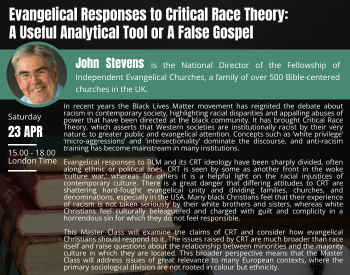In recent years the Black Lives Matter movement has reignited the debate about racism in contemporary society, highlighting racial disparities and appalling abuses of power that have been directed at the black community. It has brought Critical Race Theory, which asserts that Western societies are institutionally racist by their very nature, to greater public and evangelical attention. Concepts such as ‘white privilege,’ ‘micro-aggressions,’ and ‘intersectionality’ dominate the discourse, and anti-racism training has become mainstream in many institutions.
Evangelical responses to BLM and its CRT ideology have been sharply divided, often along ethnic or political lines. CRT is seen by some as another front in the woke ‘culture war,’ whereas for others it is a helpful light on the racial injustices of contemporary culture. There is a great danger that differing attitudes to CRT are shattering hard-fought evangelical unity and dividing families, churches, and denominations, especially in the USA. Many black Christians feel that their experience of racism is not taken seriously by their white brothers and sisters, whereas white Christians feel culturally beleaguered and charged with guilt and complicity in a horrendous sin for which they do not feel responsible.
This Master Class will examine the claims of CRT and consider how evangelical Christians should respond to it. The issues raised by CRT are much broader than race itself and raise questions about the relationship between minorities and the majority culture in which they are located. This broader perspective means that the Master Class will address issues of great relevance to many European contexts, where the primary sociological division are not rooted in colour but ethnicity.
Watch recordings from this Master Class:
1) What Is Critical Race Theory?
This session will explain the origins and claims of CRT and how it has come to such prominence in recent times. It will show how CRT developed from the wider Critical Theory derived from the Frankfurt School of Marxist intellectuals to become a totalising ideology and comprehensive worldview of contemporary society.
2) What Is Racism?
This session will consider and critique the way in which CRT defines racism. CRT advances a very different understanding of what racism is than more traditional conceptualisations, highlighting its systemic or institutional nature. This understanding of racism underlies fundamental concepts such as ‘white privilege’ and determines the way in which CRT seeks to counter racism.
3) What Does It Mean To Be An Anti-Racist?
This session will examine the way in which CRT seeks to address racism in contemporary society. It will consider what CRT theorists regard as necessary to be an ‘anti-racist’ and also the political objectives of the BLM movement. We will also introduce some of the secular critiques of CRT.
4) Is Critical Race Theory a False Gospel?
In this session we will move to provide a biblical critique of CRT. Some evangelicals have dismissed CRT, and wider social justice ideology, as a false gospel that imperils the church and society. Others have argued that it sheds light on the reality of sin in our fallen world. We will examine the arguments and assess their validity.
5) How Does the Gospel Address the Problem of Racism?
In the final session we will move to construct a biblical response to the issue of racism in our society and our churches. Whatever our view about the validity or otherwise of CRT, the gospel ought to produce radical racial reconciliation. We will consider how this should be modelled and reflected in our lives, churches, and ministries.

